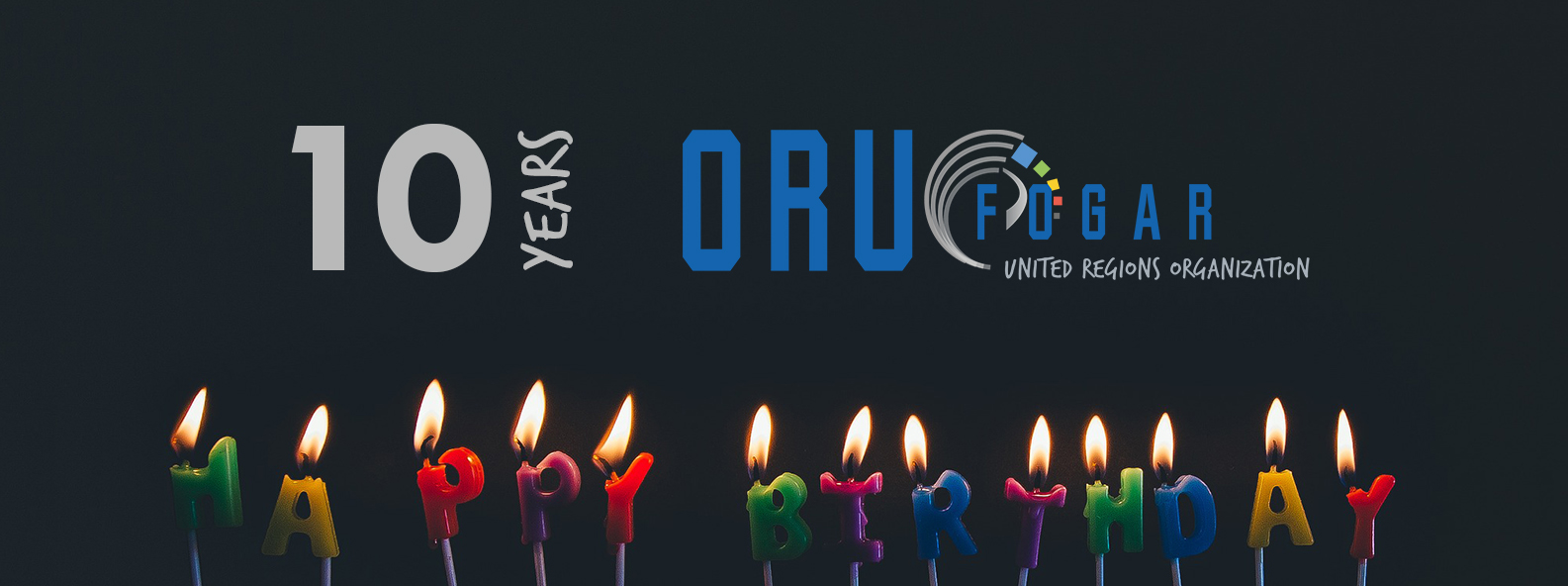ORU Fogar turns 10 years old!

The United Regions Organisation was created during the first International Forum for a Territorial Approach to Development, on the 7th March 2007, in Marseille
On the 7th March, ORU Fogar celebrated ten years after its creation in 2007 in Marseille, France, during the First International Convention for a Territorial Approach to Development organised by the Provence-Alpes-Côte d’Azur Regional Council (PACA), the United Nations Development Program (UNDP) and the Conference of Peripheral Maritime Regions (CPMR). A decade later, the United Regions Organisation has celebrated its anniversary looking back on its many achievements in the field of decentralisation and regionalism.
The Marseille Forum took place between the 5th and the 7th March 2007, with a broad participation of regional networks. On Wednesday 7th, on the side-line of the Conference and with the desire to create a coherent work framework with the United Nations system, a few regional international organisations representing more than 500 regional authorities signed the “Declaration of the Regions in the Governance of Globalisation”. It reflects their decision to launch preparatory work for the creation of a Global Forum of regional networks, committed to working together to make the voice of the regions heard in the international arena.
“Today we are doing something new and important. Together, the regional networks here gathered […] can carry out innovative work. The regions have the right size, institutional and territorially peaking, to tackle important issues. The time has arrived for the international organisations and the States to acknowledge the fact that, without the territories’ mobilisation, it is impossible to implement projects”, stated Claudio Martini, President of Tuscany and of the CPMR, who later on became first President of Fogar.
Forum of Global Associations of Regions
The Marseille Declaration laid the foundations for the official creation of the Forum of Global Associations of Regions (FOGAR) in Cape Town, South Africa, on the 24-25th August 2007. The founding members were CPMR, AIRF, ARFE, IT4ALL, nrg4SD, Norte-Grande Argentino, el Northern Forum, OLAGI, ZICOSUR, the Conference of Presidents of the EU’s Ultra-peripheral Regions, the Inter-Mediterranean Commission of the CPMR and the regions of Tanger-Tétouan (Morocco) and Brittany (France). Later on, in July 2010, Regions and Federal States were allowed to accede to the United Regions Organisation (ORU) on an individual basis.
The first President was Claudio Martini (2007-2010), who was succeeded by Michel Vauzelle, President of the PACA region (2010-2012) and Paúl Carrasco, Prefect of the Ecuadorian region of Azuay (2012-2016). At the last General Assembly of the organisation (Quito, Ecuador, 16th October 2016) the current President and Vice-President were nominated: Abdessamad Sekkal, President of the Moroccan region of Rabat-Salé-Kénitra, and Laurent Wauquiez, President of the French region of Auvergne-Rhone-Alpes and the AIRF (succeeding the former Vice-President, Abdelkébir Berkia, Vice-President of Rabat-Salé-Kénitra).
A decade of success
In ten years, ORU Fogar has grown and evolved greatly, achieving many successes as a representative of the regional world before the international bodies. It has taken part, through the Post-2015 Work Group (now called 2030 Development Group), in the debates on the Millennium Development Goals (MDG) and their evolution towards the Sustainable Development Goals (SDG). It has also promoted a Work Group on Food Security that has organised two international Summits to address this issue: the 1st Summit of the World Regions on Food Security (Senegal) in January 2010, and the 2nd Summit was held in Medellin (Colombia) in October 2012.
As far as the Climate Change issue in concerned, ORU Fogar has participated actively in the different editions of the UN COP Conference and it currently collaborates in a variety of projects led by its members, such as the “100 Climate Solutions Project Campaign” initiative by R20 and the “RegionsAdapt” initiative by nrg4SD. In 2008 a collaboration agreement was signed with the UNDP, with whom ORU has worked on the four editions of the World Forum on Local Economic Development (LED) together with the other members of the Executive Committee. Other UN agencies that have signed agreements with ORU are FAO and ILO.
In the last years, the organisation has rethought its structure in order to improve its efficiency and it has become an international service platform for the regions. Strongly determined to support its members, it has launched a strategy to offer resources, capacities, partnerships or experiences to the regional governments. An example of that are the abovementioned projects on Climate Change, as well as the RIS3 program promoted by the 2030 Work Group or the Regional Best Practices Award, already in its second edition.
Although much still needs to be done, the organisation is moving progressively forward towards the objective of making the voice of the regions heard and promoting a governance model geared towards balanced development and territorial cohesion, becoming the benchmark for regional development in the global debate.
Related content
Check ORU Fogar's path through its Flickr photo albums








































































